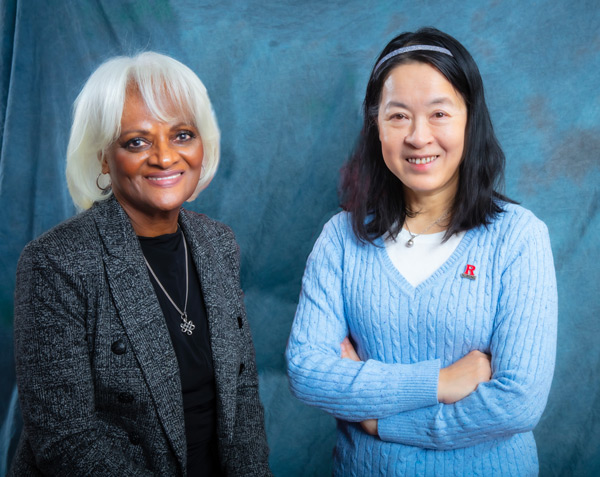Center for Health Equity and Systems Research
Established in 2023, the Center for Health Equity and Systems Research (CHESR) at Rutgers School of Nursing provides a nexus for rigorous research that elucidates the harmful effects of systematic inequities on health outcomes and quantifies the impact of approaches designed to mitigate them.


Nursing Science to Advance Equity
In keeping with the funding priorities of the National Institute of Nursing Research (NINR) at the National Institutes of Health (NIH), CHESR advances research that furthers health promotion, equitable health outcomes, and equitable access to high-quality health care. Also recognizing the need for a robust nursing workforce, CHESR embraces Nursing Health Services Research, testing differing models of nursing care delivery as well as interventions aimed at enhancing nurse resiliency and reducing occupational burnout.
“CHESR will enable us to reduce research silos, address National Institute of Nursing Research (NINR) funding priorities, facilitate interdisciplinary research collaborations, and provide workshops and seminars that are easily accessible.”
— Dean Linda Flynn, PhD, RN, FAAN

Mission
Our mission is to serve as a nerve center for interdisciplinary research that further elucidates systematic inequities and quantifies the impact of approaches designed to mitigate them. CHESR also serves as a hub for systems research that investigates the impact of health care system attributes on staff and patient outcomes, and tests new models of care.

Vision
Our vision is to gain international recognition for the generation of evidence aimed at reducing health disparities, improving the health outcomes of marginalized populations, and supporting high-quality patient care across the care continuum.

Focus Areas
Health care Equity—Reduce and eliminate the systemic and structural inequities that place some at an unfair, unjust, and avoidable disadvantage in attaining their full health potential.
Social Determinants of Health—Identify effective approaches to improve health and quality of life by addressing the conditions in which people are born, live, learn, work, play, and age.
Population and Community Health—Address critical health challenges at a macro level that persistently affect groups of people with shared characteristics.
Prevention and Health Promotion—Prevent disease and promote health through the continuum of prevention—from primordial to tertiary.
Systems and Models of Care – Address clinical, organizational, and policy challenges through new systems and models of care.
Nursing Health Services Research—Examine access to, and the use, costs, quality, delivery, organization, financing, and outcomes of health care services to produce new knowledge about the structure, processes, and effects of health services for individuals and populations.
Inspiring Interdisciplinary Collaboration
Recognizing that the delivery of equitable care must be grounded in interdisciplinary collaboration and teamwork, CHESR provides an infrastructure for research-focused faculty to collaborate with other centers within and housed at the School of Nursing. An example is the School of Nursing’s François-Xavier Bagnoud (FXB) Center, which has led programmatic grants and contracts aimed at mitigating health inequities and risks since 1987. Through collaborations, CHESR is adding new evidence-based research to existing and highly regarded health care equity programs.
“Multiple opportunities exist to design meaningful, collaborative research studies to discover bold new ways to improve health outcomes for individuals and communities who are at greatest risk for health inequities.”
— Andrea Norberg, DNP, MS, RN, Executive Director of the FXB Center


Building Expertise to Influence Change
As one of the few mentoring and training centers in the nation for conducting Nursing Health Services Research, CHESR boasts tenured faculty members who have completed formal training in this specialized arena and have established highly successful, funded programs of research that influence policy. CHESR provides a collaborative space for faculty and student scholars to expand their knowledge and skills while developing and testing differing models of nursing care delivery and nursing workforce interventions.
Center Leadership
Director, Haiqun Lin, MD, PhD, Professor (Tenured)
Dr. Lin earned her PhD in biostatistics and is a recognized expert in longitudinal and multilevel modeling, mediation analysis, and latent class modeling with random effects for longitudinal and time-to-event data. Her focus is on health services research, cancer research, as well as mental health and aging research. She is currently teamed with Dr. Olga Jarrin Montaner on two NIH-funded R33s and an NIH-funded R01 that focus on improvements in late-life care for older persons living with dementia.
Linda Flynn, PhD, RN, FAAN, Professor (Tenured), Dean of Rutgers School of Nursing
Member
Dean Flynn completed a two-year postdoctoral research fellowship at the Center for Health Outcomes and Policy Research (CHOPR), at the University of Pennsylvania School of Nursing, where she received formal training in Nursing Health Services Research; she is a CHOPR Senior Fellow. Her research focus is on quantifying the effects of health care facility culture and RN staffing levels on nurse and patient outcomes. She was among the first to extend this line of inquiry to non-acute clinical settings including Medicare-Certified Home Health, skilled nursing facilities, and partnered with Dr. Thomas-Hawkins to extend these investigations to outpatient dialysis centers. Her research has been funded by the Patient-Centered Outcomes Research Institute, the Robert Wood Johnson Foundation, and the ANNA.
Charlotte Thomas-Hawkins, PhD, RN, FAAN, Associate Professor (Tenured) and Associate Dean of the Division of Nursing Science
Member
Dr. Thomas-Hawkins is is formally trained as a Nursing Health Services Researcher (NHSR). Her research focus is on organizational factors affecting clinical outcomes of patients receiving chronic renal dialysis. She has received previous funding from NIH and several funding awards from the American Nephrology Nurses Association (ANNA). Results from the ANNA-funded studies were leveraged to influence federal policies related to RN staffing in outpatient dialysis centers.

Join Us and Become an Affiliate Member
Members and their invited guests/collaborators have access to:
- Private and group mentorship sessions on research design and data analyses
- Collaborative, interdisciplinary research opportunities
- Modest, competitive intramural funding for pilot studies
- Information on funding resources
- Seminars and lectures, ranging from one to three hours in length



